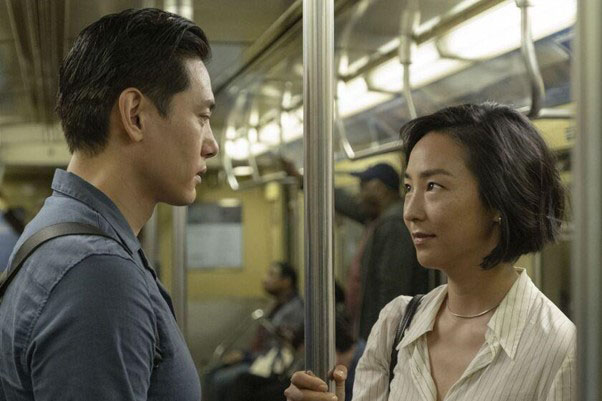You wouldn’t think that the recent Oscar nominee for Best Picture (Celine Song’s “Past Lives”) has much in common with the Will Gluck romantic-comedy “Anyone But You”, but both films are an unwelcome reminder that contemporary romances keep forgetting the most important thing – a burning romance. I left both films with a similar ambivalence. Is this the best we can do for romance on screen?
It’s been 14 years since director Will Gluck’s winning sophomore feature “Easy A”, and his subsequent oeuvre since has been a case of diminishing returns. That film, a very loose adaptation of “The Scarlet Letter” features a very funny and very game Emma Stone playing comedic romance to great effect. “Anyone But You” (co-written with Ilana Wolpert) is a loose adaptation of Shakespeare’s “Much Ado About Nothing”, but this very loose adaptation of a familiar literary work has none of the easy charm of “Easy A”. Instead, “Anyone But You” is yet another entry in a long line of Hollywood romantic comedies that feels too lethargic to excite, and too contrived in its attempts to eke romantic gold out of the duelling charms of Sydney Sweeney and Glen Powell.
The opening sequence is a potential meet-cute where investment banker Ben (Powell) saves law-student Bea (Sweeney) from an awkward restroom situation in a coffee-shop.
Despite hitting it off at first, “Anyone But You” creates contrived male posturing and bad communication to turn the potential lovers into sworn enemies. Six months later when Bea’s sister (Halle) and the sister of Ben’s best friend (Claudia) plan a destination wedding in Sydney, Australia, the wedding party tricks the pair into a romance to save the wedding. It’s a convoluted plot to sustain the romantic comedy here, although one could argue the same for the equally contrived miscommunication errors that abound in “Much About Nothing”. Even if miscommunicated contrivances are the bedrock of romantic comedy, Shakespeare’s play has robust characterisations, moving poetry and heightened character stakes. In “Anyone But You”, little feels imperative so that it’s hard to care who ends up with whom. The sluggish energy of the script feels further compromised by editing patterns that rob the comedic potential of many moments, instead leaving the audience to linger in those that interrupt any possibility of propulsion.
Glen Powell and Sydney Sweeney in “Anybody But You”
Representing affectations of romance on screen must come with some element of vulnerability, but “Anyone But You” feels false and unnatural at every turn so that it’s hard to discern what stakes a foiled romance might have for any of the characters. Sweeney’s Bea is a mystery of mixed-characterisation – she is either a scatterbrained girl, or an acerbic ice-queen who takes no prisoners. She is ambivalent about her law-school life, but we can’t discern what about it she dislikes. She’s resentful of her parents thrusting her anodyne ex-boyfriend at her but we can’t tell what about him she finds objectionable. Neither can we tell what in Ben’s generally too-cool, smarmy countenance she’s meant to find so irresistible. With his million-dollar smile, he is in the wrong movie, or in the wrong character. Amidst an increasingly frenetic ensemble, he seems to be above the admittedly tedious drama, but it turns the performance into one even more unevenly yoked.
Sweeney does not look older than her 26 years and seems worlds apart from Powell’s too-cool-for-school hero, especially when he looks every bit of his 35-year-old age. It’s an aesthetic that already finds their performance styles clashing, but leaves “Anyone But You” floundering even more when neither of the two seem wholly certain how to modulate to the rhythms of each other. The screenplay is already failing to offer anything meaningful or even passingly engaging in the pairing, and the parallel romance of Halle and Claudia (Hadley Robinson and Alexanda Shipp) is even more ineffective. This isn’t love, but this isn’t even a dramatically urgent script. Instead, “Anyone But You” functions best as a chance for the cast to have a trip to Australia. It’s clear from the end-credits, set to a not-funny joke featuring Natasha Beddingfield’s “Unwritten” that are having a good enough time; if only they were as intentional about ensuring the audience had fun too.
Director and writer Celine Song’s “Past Lives” is an altogether more serious and earnest approach to romance, if not always for the better. There’s a lot to be said about the photography of Shabier Kirchner (notable for his work on Steve McQueen’s “Small Axe”) who is thoughtful about spaces and people and emotions. If there’s anything in “Past Lives” that feels consistently engaged with the moody, melancholy, wistful fissures of love that the film wants to evoke, it’s his work. If only those adjectives could be as earnestly attached to the actual emotional weight of the film. Instead, I search through the 100 or so minutes of “Past Lives” and even as it is formally superior to the generic brightness of “Anybody But You”, I struggle to find anything resembling emotional acuity or meaningful emotion. The film is a would-be love-triangle featuring Nora (an American-Korean) who finds herself contemplating her 24-year relationship with her Korean childhood “sweetheart” (Hae Sung) who visits her and her American husband (Arthur) in New York.
A brief first-act introduces us to two-preteen children whose childhood rapport must carry the weight of the entire movie. In 2000 Seoul, two adolescent children develop feelings for each other, but the childhood connection is severed when the girl migrates to New York with her family. Even the best child-actors would baulk at the responsibility when the actual script offers them nothing to identify either of them with a personality. When we meet the children in Act Two, Nora (Greta Lee) and Hae Sung (Teo Yoo) are grown up and reconnecting on Skype a decade later as twentysomething adults. This sequence should be the lynchpin.
And it’s not an impossible set-up. Who, in this digital age, has not felt themselves grow attached to someone who lives on their computer but not in real life? Who has not felt that frisson of excitement when we hear the ding of a message? It’s such a familiar ache. Song can translate none of this to the text.
Neither can the actors who give us baleful glances but little that lingers. The editorial possibilities of making that person on the screen into the exact paragon of romance we imagine in our head is a 21st century certainty. But, “Past Lives” has no adeptness at translating that very common thing into its world, and what should be a meaningful yearning for connection across the internet for two reunited friends feels barren and colourless and dry. That act ends with the connection prematurely ended before hurtling us into the longer third act where most of the film takes place.
Teo Yoo and Greta Lee in “Past Lives”
After offering nothing in the way of establishing who these people are, to themselves or each other, Song drops us into their lives a decade later now fully immersed in what might be considered a romantic triangle but feels like three parallel lines each onto themselves, each more opaque than the other. Moment after moment I found myself vacillating between annoyance and incredulity. Typically, I might find myself charmed by the gossamer thinness of the sensibilities if it came armed with something that felt earnest, but instead I find “Past Lives” too satisfied with itself, happy to offer us vague suggestions and mere nods to something knottier, something more complicated, something riskier.
Early in Act Three, after Nora announces that her childhood friend will be visiting New York for the first time, her husband wonders at the timing, jokingly wondering if she might leave him for her childhood sweetheart. “Do you even know me?” she jokingly retorts. I don’t know if he does, but we don’t. Greta Lee might know, but the actual film struggles to convey it. Who is Nora? Is she a woman who feels ambivalent about what she cannot share with her white husband? Is she a woman who regrets migrating from Korea? “Past Lives” lets itself off too easily by allowing Nora to remain too remote. Pretty images abound, but the entire film feels too docile for the messy emotions that come with forging and breaking connections. So, we are left with a film that cannot muster up a point-of-view on any inner life of these people – what kind of writers are Arthur and Nora? The two meet at a writing workshop. Most of the film takes place in New York as Nora writes a play but there’s little to identify a literary personality of any kind for her. What themes navigate their work? Two of the main trio are writers and nary a moment of this feels grounded in anything linguistically exacting. What kind of marriage do they have? Do they have friends? What are they passionate about? Hae Sung spends two decades yearning over Nora, why? Does he resent her for migrating? He speaks of his poorness. Does it affect how he thinks of himself?
The film’s title derives from the Korean concept, “inyeon”, meaning fate or providence. Nora explains that’s a way to explain how present-day relationships are shaped from many different versions of the past lives of the people involved. It’s a nice idea, but it’s hard to resonate when “Past Lives” offers little below the surface. Who are any of these people? In their past lives they must have meant something to each other, but they mean very little to each other in this present one beyond figures for Shabier’s camera to tenderly frame. There’s no true vulnerability or naked pain here, and so the chance of a truly resonant romantic ache is impossible. The characters are empty enough for me to imagine my own heartache in its own stead, but hazy characterisations and intriguing concepts aren’t enough to sustain a movie.
Anybody But You is now playing in local cinemas; Past Lives is available on Prime Video and other streaming platforms







